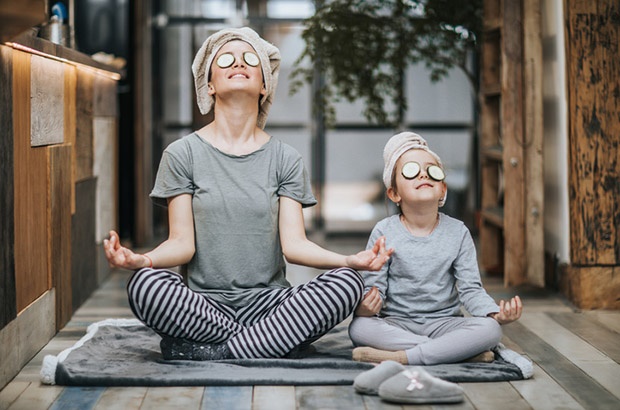
We advise others to be calm, aware – mindful – in particularly worrying situations, and help them deal with anxiety and stress by engaging in activities such as yoga and the like. But we don’t usually apply that same thinking to children.
Sure, we encourage them to talk about their feelings, but do we always make sure they work through them? Are we teaching them to be mindful?
Mindfulness, by definition is:
“The quality or state of being conscious or aware of something."
“A mental state achieved by focusing one’s awareness on the present moment, while calmly acknowledging and accepting one’s feelings, thoughts, and bodily sensations, used as a therapeutic technique."
- Also read: How to help kids cope with anxiety
How mindfulness changed these teachers
When adults practise mindfulness, they often end up reducing their stress levels, and improving their mental and physical wellbeing.
Hoping to prove this, psychologist Carol Surya and Biodanza facilitator, sculptor and entrepreneur Carmen Clews, developed the pilot study and training programme for the local NGO WISE (Wellbeing in Schools and Education) – a wellness-based programme that focuses on mindfulness practice in schools.
When first visiting local schools, Clews and Surya noticed the aggressive way in which children were communicating and the high incidence of bullying. But they also witnessed the high stress levels of educators, who themselves also struggle with many daily challenges.
In some instances this leads to teachers lashing out, and even hitting the children, making mindfulness in adults an area that needs to be explored first as it is counterproductive to the positive and important learning work that needs to be taking place in a classroom.
So in the pilot study, delegates completed both the Staff Personal Wellbeing programme (an in-depth experiential training, homework and follow up over eight weeks), as well as the Children’s Wellbeing programme (teaching and implementation of practical tools) to use with the children.
These practical tools include the InnerMagic children’s self-esteem board game and the MagicMat children’s story book and animation. These educators reported significant reductions in their own stress levels, alongside a significant positive difference in children’s behaviour. They reported decreased absenteeism of both learner and teacher, reduced high-risk behaviour by learners and reduced incidents of aggression in the classroom.
“The WISE programme has influenced my understanding of children, helping me to help them deal with issues they can’t deal with. I have empathy and understanding toward them,” said one of the participants.
Why it’s important to teach kids to be mindful too
Mindfulness is becoming common practice in international schools, with studies reporting reduced stress in children and enhanced mental performance. Over 5 000 UK teachers have been trained in teaching mindfulness, and 2017 saw the roll-out of a mindfulness curriculum across many US schools.
Many children in South Africa are born into harsh conditions such as poverty, domestic violence and poor-quality schooling, leaving them with a difficult start in life. Too often we see vulnerable children in challenging circumstances resort to negative coping behaviours – like violence, bullying, alcohol and drug abuse and even suicide.
With over 2 million orphaned and vulnerable (OVC) children in South Africa, immediate intervention and action is needed to provide children with healthy coping mechanisms and tools to empower themselves.
“The suicide rate for South African children aged 10-14 years old has more than doubled in the past 15 years, and yet we continue to place importance on teaching Maths and English in schools, when children would surely benefit from resources that can equip them with self-esteem, self-sufficiency and self-love that can contribute to their overall well-being,” says Surya.
It’s therefore important to teach them emotional intelligence, non-violent communication, forgiveness, gratitude and mindfulness, which will ultimately result in expressive, more confident, happier children.
Mindfulness tips to practise at home
Surya therefore offers the following tips for parents and caregivers to practise mindfulness with children at home:
1. "Recharge" together
Before starting homework or eating supper, lie down on your backs with your feet up on a chair and close your eyes 'recharging' for a few minutes. You could play calming music or chat about the best part of your day. To come out of it, bring your knees towards your chest; roll over and wait a few seconds before slowly sitting up.
2. Take a breather
Stop what you or the kids are doing and just take a few moments to breathe deeply and slowly. Conscious breathing is an immediate way to trigger the parasympathetic part of our nervous system, which brings about a feeling of calm.
3. "Time-in"
Get your kids and yourself used to a daily practice of 'time-in', where you tune into your inner-world. You can do this by gently focusing your attention on your breath, following the cool air in and the warmer air out through your nostrils. Another great way is to simply put one hand on your heart and one on your belly, close your eyes and become aware of your heartbeat.
4. Imagine a safe natural place
Encourage your children to create a beautiful safe place in their imagination. Once picturing all the colours, sights, sounds and smells in this place, they can imagine being in this place themselves and using this visualisation to feel calm and peaceful. It's great to get them to invite a "magical" helper or friend to this place, who can inspire and motivate them with any challenges.
Are there any other ways you can think of to encourage mindfulness in ourselves and our children? Tell us by emailing chatback@parent24.com and we may publish your tips and comments.
Read more:
- WATCH: Anxiety in teens: what it looks like and strategies to help
- Being moody isn't a mental health issue
- Tapping: a great way to help kids deal with anxiety
Sign up to our weekly newsletter to receive Parent24 stories directly to your inbox.




 Publications
Publications
 Partners
Partners














